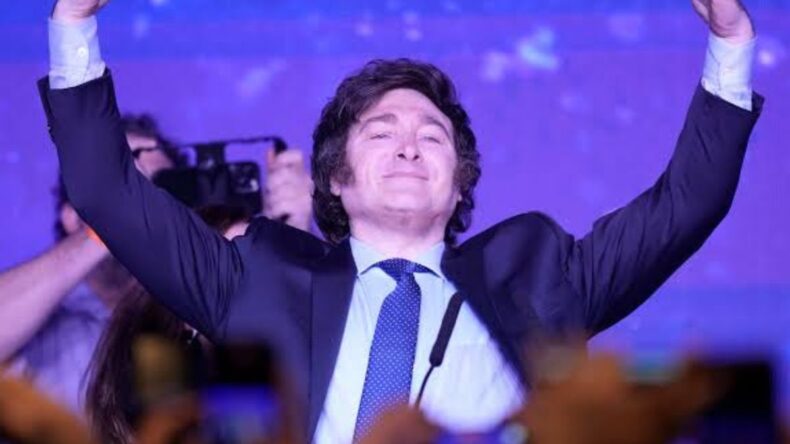
In a surprising turn of events, Javier Milei, a radical libertarian economist and political outsider, emerged victorious in Argentina’s primary poll. His unexpected win highlights a notable shift towards the right within the South American nation, setting the stage for a transformative presidential election.
Milei’s Unconventional Journey to Victory
Javier Milei, once a television personality and a single-term congressional representative, secured an astounding 30.1% of the primary vote. This outcome surpassed the average forecast of 20% predicted by pollsters, reflecting his growing influence. Known for advocating extreme austerity measures and the dollarization of Argentina’s economy, Milei’s radical platform resonated strongly with voters.
Shifting Political Landscape: New Leaders Emerge
Milei’s triumph placed his Freedom Advances party ahead of other contenders. The centre-right force Together for Change secured 28.3% of the vote, while the ruling populist coalition Union for the Homeland, represented by centrist economy minister Sergio Massa, earned 27.2%. The primary poll showcases a significant shift towards right-wing ideologies with these results.
Bold Statements: Milei’s Vision for Change
Strong statements accompanied Milei’s victory. He expressed a determination to end what he termed “Kirchnerism” – a reference to the leftist populist elements within the Union for the Homeland coalition. This sentiment resonated with those frustrated by the perceived shortcomings of previous governments, mainly influenced by former president Cristina Fernández de Kirchner.
Unique Electoral System: A Glimpse of Public Sentiment
Argentina’s mandatory primary voting system provides a valuable glimpse into the nation’s overall political sentiment. In a country where traditional polling methods can be unreliable, the primary poll stands as an essential barometer of public support.
Rising Rightwing Tide: Bullrich’s Victory and the Path Forward
The rightwing wave was further evident in the victory of Patricia Bullrich, a former security minister, who secured 17% of the vote under the banner of Together for Change. Bullrich’s hardline stance and commitment to dismantling the incumbent government’s legacy resonated with voters, securing her victory over the more moderate Horacio Rodríguez Larreta, the Mayor of Buenos Aires, who earned 11.3%.
Frustration and New Hope: Milei’s Impact
Javier Milei’s success underscores the widespread frustration among Argentines regarding the country’s economic instability. The Managing Director of Buenos Aires-based political consultancy Cefeidas Group, Juan Cruz Díaz, noted that Milei’s performance reflects the public’s dissatisfaction with the inability of recent governments to deliver lasting economic stability. Milei’s resonance with this sentiment signals a pivotal shift in the political landscape.
Economic Uncertainty and Electoral Outcomes
The primary poll’s outcome also amplifies concerns surrounding Argentina’s fragile economy. With inflation surpassing 115%, critically low foreign exchange reserves, and a significantly depreciated peso, the economic landscape is marred by challenges. Approximately four in 10 Argentines are grappling with poverty, underscoring the urgency for effective leadership and policy changes.
Implications for the Upcoming Presidential Race
While Milei’s path to victory in the October presidential election remains uncertain due to his limited national political network, his unexpected win has shaken up the race. Analysts believe that Milei’s success threatens Patricia Bullrich’s journey to the presidency. The competition between the two candidates, appealing to a similar rightwing demographic, could benefit Sergio Massa.
A Dynamic Race Ahead: Shaping Argentina’s Future
As Argentina prepares for the presidential election, the impact of Milei’s victory reverberates through the political landscape. While incumbent President Alberto Fernández and his deputy Cristina Fernández de Kirchner are absent from the polls, the emergence of new leaders and ideologies shapes the country’s future. As the electoral race unfolds, the competing visions for Argentina’s economic stability and political direction will define the nation’s trajectory in the coming years.













